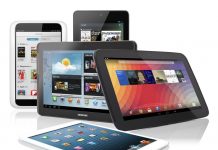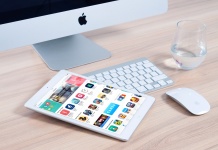 What’s the eReading device forecast look like? More gadgets than you can shake a stick at…
What’s the eReading device forecast look like? More gadgets than you can shake a stick at…
Browsing through articles and press releases on new tablets and eReaders coming out is becoming a full-time occupation. After querying many of my business contacts, fellow writers & book reviewers only a handful knew of an off-center new tablet/eReader coming out that they were excited about, let alone knowledgeable enough about to warrant purchasing. The majority of folks replying played it safe, going for one of the big three: iPad, Kindle or Nook. Kobo’s made a bit more of a name for itself in the American market as of late, but the brand recognition wall seems to be a huge obstacle to overcome for the new devices hitting the market.
“Most consumers aren’t so tech-savvy that they will search out all minute differences between the various available eReading devices,” one of my contacts wrote to me. “Most will simply google ‘best eBook reader of 2011’ and pick one from among the top three.”
Another acquaintance of mine replied with this gem: “I don’t want an eReader at all. I’m still trying to get over what’s happened to books. They’ve become the pictures stuck into the shapeless mounds on the restaurant table in the movie Brazil…”
Even more interesting is the number of replies I received that blur the line between eReaders and tablets almost completely. The eReading device, it seems, must do more than read eBooks and the tablet likewise “must” have “good” eReading capabilities. These tandem demands-so prevalent in the comments after almost any device related article-provoke the question of “why have separate devices at all in the future?”
The dedicated eReader-to many-serves its own function, mainly keeping the idea of reading a ‘book’ somewhat separate; a nod, if you will, to the ghost of paperbacks past. Many of today’s gadget owners grew up respecting the book, thus they yet regard it as a category unto itself. The tablet, however, appeals to a broader audience including those that love reading eBooks but are unwilling to part with all the functionality of a ‘real’ computer, or to carry more than one device around with them.
Americans are not the only ones wading around in piles of devices, spending more of their hard-earned dollars on digital literature: Russian consumers are eReading away along with those in South Korea, the UK, the Netherlands, Australia and Germany. It also appears that tsunamis, earthquakes and nuclear disasters can’t keep Japanese consumers from rebounding and buying more eBooks.
The choices are many-besides being simultaneously categorical-but thanks to the many folks that sort through all the new devices for us, we can look at nifty side-by-side comparisons of all the pertinent and pivotal information.
And what of all the devices that don’t make the top ten? To them we wave and warble out a warm “C’es la vie”, which might as well be French for “niche market.”
Via Greene Ink
(Photo: Cloned Milkmen)

































“Most consumers aren’t so tech-savvy that they will search out all minute differences between the various available eReading devices.” On the other hand, not-so-tech-savvy users will study commercials and ads, ask friends, and examine cell phones to pick “just the right one.” Ebook readers can easily become popular enough to warrant more consumer attention, and if it does, we might see even more models out there, much like the current glut of cellphones.
I “love reading books” and am “unwilling to part with all the functionality of a ‘real’ computer”. This is why I refuse to waste my money on a tablet which neither displays books well nor has the functionality of a real computer.
Perhaps it is healthy to realize that all e-book reading devices are actually fulfillment services. Corporate interest is not how many books you read, but how many you purchase. Lurking there is an inverse incentive. Lurking also is increased sales, not of books, but of devices. These are products just like paper books are. But the real “death of books’ will follow when we start buying more and more devices out of longing for book collections.
Peter, tablets are coming on. The iPad is an excellent ereader (I thought I would go on reading on my iPhone, but the iPad is even better). The OS is developing: you do have SSH/Telnet access to other machines, but so far no command-line access to the tablet itself. Android may do that already.